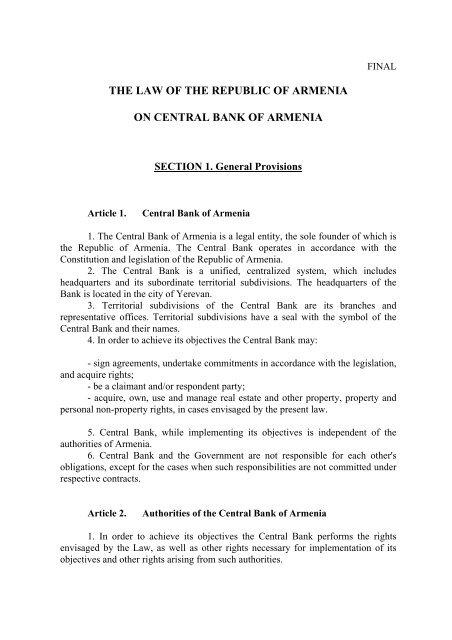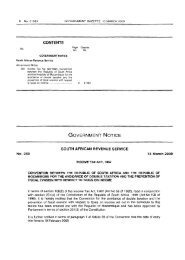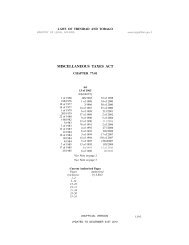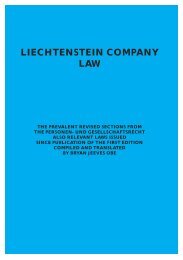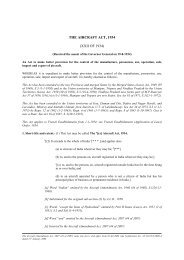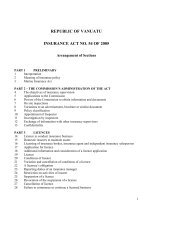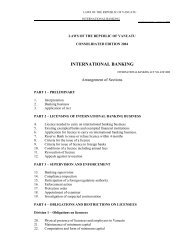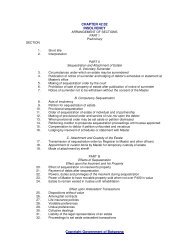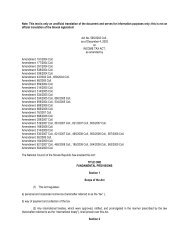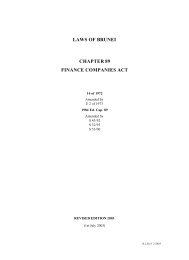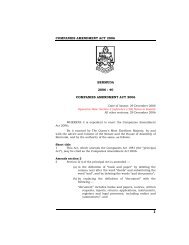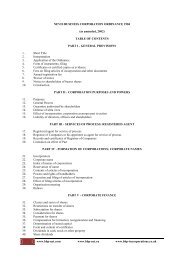THE LAW OF THE REPUBLIC OF ARMENIA (RA)
THE LAW OF THE REPUBLIC OF ARMENIA (RA)
THE LAW OF THE REPUBLIC OF ARMENIA (RA)
You also want an ePaper? Increase the reach of your titles
YUMPU automatically turns print PDFs into web optimized ePapers that Google loves.
FINAL<br />
<strong>THE</strong> <strong>LAW</strong> <strong>OF</strong> <strong>THE</strong> <strong>REPUBLIC</strong> <strong>OF</strong> <strong>ARMENIA</strong><br />
ON CENT<strong>RA</strong>L BANK <strong>OF</strong> <strong>ARMENIA</strong><br />
SECTION 1. General Provisions<br />
Article 1.<br />
Central Bank of Armenia<br />
1. The Central Bank of Armenia is a legal entity, the sole founder of which is<br />
the Republic of Armenia. The Central Bank operates in accordance with the<br />
Constitution and legislation of the Republic of Armenia.<br />
2. The Central Bank is a unified, centralized system, which includes<br />
headquarters and its subordinate territorial subdivisions. The headquarters of the<br />
Bank is located in the city of Yerevan.<br />
3. Territorial subdivisions of the Central Bank are its branches and<br />
representative offices. Territorial subdivisions have a seal with the symbol of the<br />
Central Bank and their names.<br />
4. In order to achieve its objectives the Central Bank may:<br />
- sign agreements, undertake commitments in accordance with the legislation,<br />
and acquire rights;<br />
- be a claimant and/or respondent party;<br />
- acquire, own, use and manage real estate and other property, property and<br />
personal non-property rights, in cases envisaged by the present law.<br />
5. Central Bank, while implementing its objectives is independent of the<br />
authorities of Armenia.<br />
6. Central Bank and the Government are not responsible for each other's<br />
obligations, except for the cases when such responsibilities are not committed under<br />
respective contracts.<br />
Article 2.<br />
Authorities of the Central Bank of Armenia<br />
1. In order to achieve its objectives the Central Bank performs the rights<br />
envisaged by the Law, as well as other rights necessary for implementation of its<br />
objectives and other rights arising from such authorities.
2<br />
2. In order to achieve its objectives the Central Bank issues guidelines,<br />
directives and other normative and separate legislative acts within its authorities.<br />
Article 3.<br />
Registration and publication of the normative acts of the<br />
Central Bank<br />
1. Normative acts of the Central Bank shall enter into force within 3 days<br />
from the moment of their publication. Normative acts of the Central Bank do not<br />
bear grandfather clause.<br />
2. Normative acts of the Central Bank are published in the newspapers,<br />
within 3 days after registration in the state agency.<br />
Article 4.<br />
Basic Objective of the Central Bank<br />
1. The basic objective of the Central Bank is ensuring the stability of prices<br />
in the republic. In order to achieve its basic objective the Central Bank elaborates,<br />
approves, and implements monetary policy regulating monetary circulation and<br />
crediting of the economy.<br />
2. In case other objectives of the Central Bank contradict its basic objective,<br />
the Central Bank grants priority to the basic objective and is governed by the<br />
necessity of its implementation.<br />
Article 5.<br />
The Other Objectives of the Central Bank<br />
1. The other objectives of the Central Bank are:<br />
a) to ensure necessary conditions for the stability, solvency, liquidity and<br />
normal activities of the banking system of the Republic of Armenia;<br />
b) to create an effective settlement and payment system; and<br />
c) to issue currency of the Republic of Armenia, and organize and regulate<br />
money circulation.<br />
2. In order to perform its objectives, the Central Bank, in accordance with the<br />
legislation shall:<br />
a) exercise bank servicing of the Government;<br />
b) be the financial agent and advisor to the Government;<br />
c) license banks, and in cases envisaged by the legislation, other persons;<br />
and shall regulate and supervise their activities;<br />
d) extend loans to banks as the lender-of-last-resort;<br />
e) regulates and supervises payment and settlement system activities,<br />
including non-bank payment and settlement servicing organizations;<br />
f) owns, uses, manages international reserves of the Republic of Armenia;<br />
and
3<br />
g) collect, finalize and promulgate monetary and bank statistics<br />
(administrative statistics).<br />
Article 6.<br />
Monetary Policy Program<br />
1. Each year, within 10 days period upon approval of the State Budget by the<br />
National Assembly, the Central Bank submits the Monetary Policy Program to the<br />
National Assembly and to the Government (as an information), and publishes policy<br />
program for the next year, based on the analysis of the monetary policy at the<br />
previous year.<br />
2. Monetary Policy Program covers:<br />
- analysis and forecast of economic situation,<br />
- maximum limit of money supply in circulation and loan investments,<br />
- interest rate and exchange rate levels,<br />
- methods of monetary regulation,<br />
- other clauses defined by the Board of the Central Bank for implementation<br />
of issues as required by the Law.<br />
Article7.<br />
Cooperation with the Government and Other Authorities<br />
1. The Central Bank cooperates with the state bodies in it’s work.<br />
2. The chairman and deputy chairmen of the Central Bank regularly extend<br />
comments or clarifications to the National Assembly and the NA committees on the<br />
policy of the Central Bank.<br />
3.The Central Bank participates in drafting the economic and financial<br />
programs of the Government, and also assists in their implementation, if they do not<br />
contradict the objectives of the Central Bank. The Central Bank consults with the<br />
Government when drafting the program of monetary policy.<br />
4. The Chairman of the Central Bank can participate at the open meetings of<br />
the Government without voting power and submit written comments on the topics<br />
discussed. An authorized Government representative can participate at the open<br />
meetings of the Board of the Central Bank and submit written comments on the<br />
topics discussed.<br />
Article 8.<br />
International cooperation<br />
The Central Bank, within its authorities, represents interests of the Republic<br />
of Armenia in international financial organisations, international and overseas banks,<br />
as well as in relations with central and other banks of other countries, signs<br />
international agreements as required by the Law.
4<br />
Article 9.<br />
Deposit and Credit Activities<br />
1. The Central Bank may accept dram or foreign exchange denominated time<br />
or demand deposits, or material values exclusively from authorities of the republic,<br />
banks and other financial and crediting organizations, central banks of foreign<br />
countries and other financial and crediting organizations, international financial and<br />
crediting organizations, and, in accordance with the respective Decision of the Board<br />
of the BOA, from other persons and organizations, as well as, at the order of the<br />
latter, own and use deposits and material values.<br />
2. The Central Bank in executing it’s monetary policy can purchase for the<br />
purpose of resale and sell government bonds or other securities at the financial<br />
markets, according to the procedure set by this law.<br />
Article 10.<br />
Open Market Activities<br />
1.The Central Bank, while executing the monetary policy can buy and sell<br />
state securities at financial markets.<br />
2.The Central Bank cannot buy at its own expense state securities during the<br />
process of primary distribution. The Central Bank can buy them at the instruction of<br />
other Central Banks or top-rate banks.<br />
3.In accordance with it’s main objective, the Central Bank can issue shortterm<br />
securities, with a maturity of up to one year, through a procedure coordinated<br />
with the Government.<br />
SECTION 2. FINANCIAL PROVISIONS<br />
Article 11.<br />
Capital of the Central Bank<br />
1. The Capital of the Central Bank shall include the statutory capital, general<br />
reserves, revaluation reserves of foreign currency, precious metals, securities, fixed<br />
and other assets, retained earnings and profit.<br />
2. The statutory capital of the Central Bank is one hundred million of<br />
Armenian drams.<br />
3. The capital of the Central Bank completely belongs to the <strong>RA</strong> and cannot<br />
be pledged, confiscated against the obligations of the country or otherwise alienated.<br />
4.If the losses of the Central Bank are equal or exceed the aggregate amount<br />
of its reserves as reflected in the balance sheet, within 30 days from the moment of<br />
publication of such balance sheet, the Government transfers state securities at an<br />
average market rate to the Central Bank. The repayment of the securities is done<br />
through the state budget, or according to Article 12 of this law. Until the total
5<br />
repayment, the Government pays the annual interest at an average interest rate to the<br />
Central Bank, before December 15 of every fiscal year.<br />
Article 12.<br />
Accounting and Allocation of the Profit of the Central Bank<br />
1. The profit of the Central Bank is calculated on an annual basis, in<br />
accordance with the international accounting standards, as the difference between<br />
the total incomes generated and total expenses incurred (including losses) during the<br />
given financial year.<br />
2. The following deductions are made out of the profits of the Central Bank:<br />
- 20% of the profit is channeled to replenish the Head Reserve, until the total<br />
amount of such reserves makes 25% of the broad money,<br />
- at the amounts necessary to repay the securities envisaged for under Article<br />
12 of the present Law.<br />
The annual profit balance after the deductions is transferred to the state<br />
budget.<br />
Article 13.<br />
Income, expenses and capital investments of the Central<br />
Bank<br />
1. The Central Bank income is the income derived from the operations in<br />
accordance with this law:<br />
a) interest received and accumulated against loans, securities, banks’<br />
provisions, balance on banks’ correspondent accounts,<br />
b) all types of fees received during banking operations,<br />
c) fines and penalties collected from the banks registered by the Central<br />
Bank, other customers and contractual obligations (including those for nonperformance<br />
of mandatory provisioning by the banks as defined),<br />
d) proceeds gained from the sale of foreign currency, precious metals and<br />
other monetary values at prices exceeding the book value,<br />
e) proceeds from the sale of fixed assets and intangible assets at prices<br />
exceeding the book value and the sale of stock,<br />
f) payments on providing banking services,<br />
g) payments on loans, interest and bad debts, written-off earlier,<br />
h) donations,<br />
i) other income received on the activities envisaged by this law.<br />
2.The Central Bank is independent in planning it’s income. The income of the<br />
Central Bank is not subject to the approval of any state agency.<br />
3. The expenses of the Central Bank shall include:
6<br />
a) Operational expenses, for example:<br />
- Interest accrued on deposits attracted, credits received, securities issued<br />
and balances of customer accounts;<br />
- Expenses associated with the issuance, transportation, maintenance and<br />
elimination of bank notes, coins and monetary values;<br />
- All types of commissions and fees paid during banking operations;<br />
- Losses incurred from the revaluation of foreign currency, securities,<br />
precious metals and other assets;<br />
- Losses incurred from the sale of foreign currency, securities, precious<br />
metals and monetary values at prices lower than the book value and the purchase<br />
price;<br />
- Expenses incurred from the revaluation of fixed assets, intangible assets<br />
and stocks, sale of fixed assets, intangible assets at prices lower than the book value,<br />
as well as the ones incurred from the sale of stocks;<br />
- Expenses associated with provisions for and write-offs of bad loans,<br />
receivables, monetary values and other assets;<br />
- Expenses associated with the depreciation of fixed assets;<br />
- Payments against all kinds of services related to bank operations;<br />
- Expenses associated with international reserves management;<br />
- Expenses associated with payment system services;<br />
- Expenses associated with state foreign debt service;<br />
- Expenses associated with maintenance, service, use and insurance of other<br />
assets of the Central Bank, such as buildings, premises, fixed assets and stocks;<br />
- Fees for auditing and consulting services; and<br />
- Other expenses associated with implementation of objectives of the<br />
Central Bank.<br />
b) Administrative expenses shall include, for example:<br />
- Expenses associated with staff maintenance (staff salaries, rewards,<br />
payments to pension fund, staff training and skill upgrading, business trips and<br />
representation expenses, office vehicle operation costs and other social security<br />
expenses);<br />
- Expenses associated with the acquisition of press information and<br />
professional literature;<br />
- Expenses associated with the write-off of materials and non-durable<br />
assets;<br />
- Expenses associated with the communication means used for office<br />
purposes; and<br />
Contingent expenses (reserve for expenses).<br />
4. Capital investments of the Central Bank include:<br />
i.e.:<br />
a) capital investments on carrying out the main activities of the Central Bank,
7<br />
- construction, acquisition and major repair of working premises and<br />
constructions,<br />
- acquisition and capital repair of computers, office furniture, communication<br />
equipment and other fixed assets,<br />
- investments in the capital of legal persons for the implementation of projects<br />
directly linked with the objectives of the Central Bank,<br />
b) capital investments on administrative purposes include:<br />
- capital investments aimed at providing recreation, medical care and social<br />
benefits to the staff of the Central Bank (acquisition and major repair of premises,<br />
constructions, equipment on such purposes),<br />
- acquisition and major repair of cars and vehicles,<br />
- acquisition and major repair of telecommunication equipment used for nonoperational<br />
purposes.<br />
4. Annual expenses of the Central Bank must be approved by the National<br />
Assembly, in accordance with Article 15 of this law.<br />
Expenses of the Central bank approved by the National assembly are to be<br />
carried out, regardless of the amount of the income derived by the Central Bank<br />
during the year.<br />
Article 14.<br />
Approval of the Annual Expenses<br />
1. The Board of the Central Bank approves before November 1 of every year<br />
the plan of capital investments and expenses of the Central Bank for the next year<br />
which includes the forecast on administrative and operational expenses.<br />
The plan of expenses and the maximum value of the capital investments must<br />
be passed by a separate article of the law on state budget adopted by the National<br />
Assembly, at the presentation of the government.<br />
2. The plan of expenses and the maximum value of the capital investments<br />
must allow the Central Bank to fulfill the objectives:<br />
a) stability of prices and keeping inflation down,<br />
b) proper management of the foreign reserves and control of the exchange<br />
rate,<br />
c) banking supervision in accordance with the international standards,<br />
d) manufacture, protection and circulation of the national currency,<br />
e) setting a system of accounting in accordance with the international<br />
standards,<br />
d) ensuring proper representation in the international organizations and,<br />
accordingly, payment of wages at the level of commercial banks to involve qualified<br />
experts in the work of the Central Bank.<br />
Article 15.<br />
Accounting and Financial Reporting
8<br />
Accounting at the Central Bank shall be conducted in the manner defined by<br />
the Board of the Central Bank, in accordance with the Accounting Standards of the<br />
Republic of Armenia.<br />
The Central Bank compiles financial reports for each year in accordance with<br />
the internationally adopted practices. The financial report includes annual balance<br />
sheet, profit allocation report, as well as other reports defined by the Central Bank<br />
Board.<br />
Article 16.<br />
External Audit<br />
The accounts of the Central Bank must be audited by internationally known<br />
auditing firm, or independent organization in accordance with the order established<br />
by the legislation on a yearly basis. The auditing firm is selected and appointed by<br />
the Central Bank Board annually.<br />
Article 17.<br />
Annual and Quarterly Reports<br />
1. Each year the Central Bank must submit and publish the annual report of<br />
the previous year adopted by the Central Bank Board, before June 1, including the<br />
following:<br />
- financial report approved by the external auditing firm;<br />
- report on situation in the economy for the previous reported period;<br />
- other provisions as set by the Central Bank Board.<br />
2. The Central Bank, regularly, but not less than once in a quarter, publishes<br />
an abridged report of the economic performance of previous quarter and quarterly<br />
balance sheet of the Central Bank.<br />
SECTION 3. GOVERNANCE <strong>OF</strong> <strong>THE</strong> CENT<strong>RA</strong>L BANK <strong>OF</strong><br />
<strong>ARMENIA</strong><br />
Article 18.<br />
Chairman and Deputy Chairman of the Central Bank<br />
1. The Chairman of the Central Bank is the highest official of the Central<br />
Bank. The Chairman is responsible for the fulfillment of the objectives set by this<br />
law. The Chairman and Deputy Chairman are appointed by the National Assembly,<br />
at the presentation by the President, for a period of 7 years.<br />
In case the Chairman is absent or is incapable to perform his duties, he is<br />
substituted by his deputy, and in case of absence, or impossibility to govern by the<br />
deputy, a member of the Central Bank Board shall be the Chairman, who is the<br />
eldest among such members.
9<br />
2. The Chairman and his Deputy are appointed by the National Assembly, at<br />
the presentation by the President, and for a period of 7 years.<br />
3. The Chairman and his deputy may not hold another state title, or perform<br />
other payable work, except for the scientific research, pedagogical and creative<br />
activities.<br />
4. The Chairman of the Central Bank:<br />
- coordinates and ensures the work of the Central Bank, the Board and Board<br />
members;<br />
- chairs Board sessions, and signs the acts of the Central Bank;<br />
- organizes execution of the acts of the Central Bank Board;<br />
- represents the Central Bank in the republic and abroad;<br />
- issues licenses;<br />
- approves the list of employees of the Central Bank;<br />
- employs and fires heads of departments, other employees of the Central<br />
Bank, unless envisaged otherwise by this law;<br />
- implements other rights assigned exclusively to the Central Bank Board, not<br />
envisaged by the present Law.<br />
Article 19.<br />
The Central Bank Board<br />
1. The Central Bank Board is the highest body of the management of the<br />
Central Bank.<br />
The Central Bank Board consists of the chairman, his deputy and 5<br />
members.<br />
2. The Central Bank members are appointed by the President of Armenia for<br />
a period of 5 years. The following are the official terms for the members of the<br />
Central Bank Board.<br />
One member - 1 year<br />
One member - 2 years<br />
One member - 3 years<br />
One member - 4 years<br />
One member and all members appointed from now on - 5 years<br />
In case a vacancy occurs in the Board, the new member of the Board is<br />
appointed for the period remaining for the substituted member.<br />
3.A member of the Central Bank Board is responsible for the fulfillment of<br />
tasks delegated to him by the Board in the specific area of banking activity.<br />
4. Members of the Central Bank Board may be citizens of the <strong>RA</strong>, who have<br />
professional capacities to fulfill the provisions stipulated in Article 20 of this law.<br />
The following persons can not be members of the Central Bank Board:
10<br />
a) were found incompetent or partly incompetent by the decision of the court<br />
or were accused of committing an intentional crime,<br />
b) were disqualified or disqualified from a certain position by the decision of<br />
the court.<br />
5. Members of the Central Bank Board can not work as managers of any<br />
public-political organization, members of any authoritative body, hold any other<br />
state position, or perform any other paid work, besides scientific, pedagogical and<br />
creative.<br />
Members of the Central Bank Board can not hold any other paid position in<br />
the Central Bank.<br />
Article 20.<br />
Exclusive Right of the Central Bank Board<br />
The Central Bank Board:<br />
a) approves the charter of the Central Bank,<br />
b) approves the monetary policy program of the <strong>RA</strong>,<br />
c) approves the limits and interest rates for open market operations<br />
conducted, credits provided and deposits attracted by the Central<br />
Bank,<br />
d) approves the procedure and terms for mandatory provisioning for<br />
reserves held by the banks in the Central Bank,<br />
e) adopts normative acts defined by the Central Bank,<br />
f) establishes and adopts the distribution of responsibilities among the<br />
Board members on the presentation of the Chairman,<br />
g) establishes nominal value and type of national currency (both<br />
banknote and coins), order and conditions of their issuance and<br />
withdrawal, takes decisions on issuance and revoke and withdrawal of<br />
banknote and coins establishing the terms for withdrawal,<br />
h) decides upon membership of the Central Bank in international<br />
organizations,<br />
i) approves reports and findings of the Central Bank,<br />
j) approves the procedures and terms of crediting the Government;<br />
ja) approves the procedure on crediting the banks,<br />
jb) takes decisions on opening or closure of territorial subdivisions of the<br />
Central Bank,<br />
jc) approves annual budget of the Central Bank and financial statements,<br />
jd) defines the list of the securities which the Central Bank may discount<br />
and otherwise acquire, as well as the order and terms to own them,<br />
je) defines types of short-term securities issued by the Central Bank,<br />
terms of their issuance and redemption, terms and conditions,<br />
jf) grants banking and other licenses, revokes or considers as invalid<br />
those licenses, sets out the procedure for licensing banks and other<br />
persons in the manner defined by the law,
11<br />
jg) recognizes banks as insolvent and initiates bankruptcy procedure for<br />
insolvent banks according to the “Law of the Republic of Armenia on the<br />
Bankruptcy of Banks,” exercise other powers stipulated by the law, makes<br />
decisions stipulated by the laws on the reorganization of the banks,<br />
jh) establishes the working procedure of the Central Bank Board,<br />
ji) adopts the norms regulating the activities of the banks and the<br />
procedure of calculating,<br />
k) gives an initial consent or decline on the acquisition of a significant<br />
share in the statutory fund of banks,<br />
ka) sets the procedure and frequency of examinations and audits at the<br />
banks, and decides on extraordinary examinations,<br />
kb) license the bank auditing organizations, and set the minimum<br />
requirements for internal control at banks;<br />
kc) set the procedure, terms and regulations for issuing and circulating<br />
government securities jointly with government authorities of Republic of<br />
Armenia;<br />
kd) adopt legal acts regulating the settlement relationships and money<br />
circulation in the Republic of Armenia;<br />
ke) set the size, procedure for calculating and frequency of charging<br />
insurance premiums for the bank deposit insurance fund which ensures<br />
deposit repayment by the banks and undertake other authorities<br />
associated with the repayment of deposits;<br />
kf) approve the procedure and terms for issuing and promulgating<br />
official and other periodicals of the Central Bank;<br />
kh) define the regulation for credit risk assessment, subject to<br />
mandatory execution for the banks, the procedure and terms for<br />
supervising those entities, the balance sheets of which are incorporated<br />
in the balance sheet of the Central Bank (consolidated balance sheet) in<br />
the manner defined by law and the legal acts of the Central Bank;<br />
ki) carries out other responsibilities envisaged by this law.<br />
Article 21.<br />
Sessions of the Central Bank Board<br />
1. The Central Bank Board sessions are convened as required, at the<br />
requirement of the Chairman, deputy Chairman, or at least two members of the<br />
Board, but not less than once a month.<br />
The Central Bank Board sessions are minuted.<br />
2. A closed session can be convened when the topics to be discussed contain<br />
banking secrecy associated with banks, or the questions associated with the<br />
members of the board are to be discussed. Only the members of the Board, and those<br />
invited personally can participate at the close Board session.<br />
3. The Central Bank Board is authorized to take decisions, if at least six<br />
members of the Board are present at a session, including the Chairman and deputy.<br />
The decision is deemed to be approved if more than half of the present members
12<br />
vote for. In case of equal allocation of votes, the vote of the Chairman is decisive, or<br />
the deputy in his absence.<br />
4.The authorized representative of the Government or the member who voted<br />
against decision approved by the Board may require detailed reflection of his special<br />
opinion in the minutes.<br />
5. When necessary, according to the work procedure defined, the Board of the<br />
Central Bank may make decisions through inquiry. The decision through inquiry<br />
shall be made by the procedure of voting stipulated by Paragraph 3 of this Article.<br />
Article 22.<br />
Grounds for Dismissal the Board Members<br />
a. The Chairman and the Deputy Chairman may dismiss voluntarily, advising<br />
in written the President and the National Assembly one month before.<br />
The other members of the Board may dismiss voluntarily advising in written<br />
the President one month before.<br />
b. The National Assembly, at the presentation of the President of the <strong>RA</strong>,<br />
dismisses the Chairman or his Deputy, and the President of Armenia the other Board<br />
members, if they:<br />
- changed the citizenship,<br />
- were recognized incapable under the Court Decree, or are prosecuted by the<br />
Court for deliberate crime,<br />
- did not perform their responsibilities,<br />
- were disqualified by an authorized body or organizations, or devoid of the<br />
right to hold certain position;<br />
- because of illness or other reason have been incapable of performing their<br />
obligations and duties within a period exceeding 6 months,<br />
- were absent at the Board sessions more than 5 times in the year without<br />
objective reasons.<br />
Article 23.<br />
Obligation Members of the Central Bank Board on<br />
Disclosure the Income<br />
1. When proposed for a position of the Chairman, Deputy, and members of<br />
the Board, and then, once in every year, they must advice the Board on the sources<br />
of their income, as well as any substantial financial interests, explicit or implicit, of<br />
all the persons who conduct common economic activities with them..<br />
2. In case of discussion of any issue related to the financial interest mentioned<br />
in the present Article, the interested member of the Board, before the<br />
commencement of the discussion, must declare his interest and not participate in<br />
such discussion, to abstain from voting on that issue.
13<br />
Article 24.<br />
Employees of the Central Bank<br />
1. Employees of the Central Bank are the persons who are employed in the<br />
Central Bank as well as the servicing personnel.<br />
Employees of the Central Bank are those persons who are directly involved in<br />
performing the objectives of the Central Bank, or those who hold positions<br />
according to the Charter or Staff-list of the Central Bank.<br />
2. While serving in the Central Bank the employees of the Central Bank may<br />
not hold other public position without permission of the Chairman, or perform any<br />
other payable works, except for scientific, pedagogical and creative activities.<br />
Employees of the Central Bank may not be engaged in entrepreneurial<br />
activity, work in banks or be a bank manager.<br />
3. The Chairman of the Central Bank, his deputy, members of the Board, and<br />
the Central Bank employees can not receive loans from commercial banks for<br />
entrepreneurial activity. They must inform the Central Bank on all those loans that<br />
they have received not from the Central Bank. Such loans are accounted.<br />
4. The servicing personnel of the Central Bank includes such employees<br />
whose duties are not directly related to the execution of the objectives of the Central<br />
Bank, including those involved in the area of auxiliary servicing. Staff-list, duties,<br />
remuneration and working conditions of the servicing personnel are established by a<br />
separate order of the Chairman of the Central Bank.<br />
Article 25.<br />
Supervisory Group and Chief Supervisor<br />
1. The auditing group of the Central Bank shall be a special structural unit of<br />
the Central Bank. The chief auditor shall manage the work performed by the<br />
auditing group. The Central Bank Board shall appoint and dismiss from office the<br />
chief auditor and the members of the auditing group upon the Chairman’s<br />
recommendation.<br />
2. The supervisory group of the Central Bank:<br />
- implements supervision over current activities of the Central Bank;<br />
- supervises execution of the annual budget of the Central Bank, accounting<br />
and accounts;<br />
- supervises financial statements of the Central Bank, similar other documents<br />
and ratifies them.<br />
3. Supervisory group of the Central Bank is accountant to the Board of the<br />
Central Bank. Supervisory group of the Central Bank must inform the Chairman and<br />
the Board on each case of breach or omission.<br />
Article 26.<br />
Salary Rate of the Members of the Board and Employees
14<br />
1. The salary rates of the Chairman, Deputy, members of the Board are<br />
established by the Central Bank Board.<br />
2. Salary rates of employees are established by the Chairman, on the basis of<br />
the principles stipulated in Part 2 of Article 14 . The calculation of salary rate<br />
includes both the salary itself, and supplementary payments made by the Central<br />
Bank.<br />
Article 27.<br />
Conflict of Interests<br />
1.While performing their official responsibilities the Chairman, Deputy,<br />
members of the Board and employees of the Central Bank are governed by the<br />
legislation and objectives of the Central Bank.<br />
2. The Chairman, Deputy, members of the Board, heads of subdivisions (or<br />
persons who run common economic activities with them) may not accept gifts or be<br />
extended loans, which fact of acceptance of such gift or loan may cause, or will<br />
cause, an infringement of a neutrality principle.<br />
Chairman, deputy, members of the Board, heads of subdivisions (or persons<br />
who run common economic activities with them) may not acquire shares in banks<br />
while holding their present positions, or advice to acquire shares in banks.<br />
Article 28.<br />
Official Secret<br />
1.The Chairman, deputy, members of the Board and employees may not<br />
publish, disclose or disseminate otherwise issues of official secrecy, nor they may<br />
use such information, directly of indirectly, for their personal advantage.<br />
2. Chairman, deputy, members of the Board and employees may, and must in<br />
cases envisaged by the legislation, disclose an information of official secrecy:<br />
- at a written permission of the Chairman or the Board, or of such person or<br />
organization whom such information relates to, if such secret is exclusively the right<br />
or authority of such person or organization;<br />
- on carrying out their obligations or liabilities, including decrees of the<br />
Court, as well as decisions adopted by other authorized bodies within their<br />
responsibilities;<br />
- to supervisory group of the Central Bank, and to organization carrying out<br />
an external audit, except for information envisaged by the Law;<br />
- for the purposes of defending the interests of the Central Bank Chairman,<br />
Deputy, other members of the Board or employees in the Court.<br />
3. Official secret in the present Article means such information which has<br />
become known to officials of the Central Bank because of performing their<br />
responsibilities, including possibilities to apply concrete tools, terms and programs<br />
which have been used implementation of monetary policy of the Central Bank, as<br />
well as relating to banking supervision data, except for:
15<br />
- information published or otherwise disseminated, and<br />
- issues representing banking secrecy. The order and terms of disclosure of<br />
content of banking secret has been established by the legislation.<br />
4.The Central Bank Board may publish a list of secret information and<br />
various degrees of secrecy of such information, as well as order and terms and<br />
conditions for their use and publication.<br />
Article 29.<br />
Charter of the Central Bank<br />
The Charter of the Central Bank defines the structure of the Central Bank, the<br />
order of activities of its subdivisions, range of authorities of officials of the Central<br />
Bank, opening closure of separate subdivisions and their rights and obligations and<br />
subordination, as well as other issues relating to internal management of the Central<br />
Bank.<br />
SECTION 4. RELATIONS WITH <strong>REPUBLIC</strong>AN AUTHORITIES.<br />
Article 30.<br />
Bank Servicing of the Government<br />
The Central Bank ensures free banking servicing of the Government<br />
transactions, as stated by the legislation.<br />
Article 31.<br />
Advisory Activities<br />
On drafting the state budget, the Government or a body authorized by the<br />
Government consults with the Central Bank on issues related to the state budge,<br />
including domestic and foreign borrowings of the state, the sources, sizes, terms and<br />
conditions, as well the fields of application and the targets of the borrowings. The<br />
Central Bank submits to the Government an official conclusion on the issues related<br />
to state budget. The official conclusion of the Central Bank is attached to the draft<br />
state budget is submitted to the National Assembly for consideration, pursuant to the<br />
order established in the law.<br />
Article 32.<br />
Financial Agent<br />
The Central Bank is the financial agent for:<br />
a) allocation, registration and transfer of bonds issued by the Government, as<br />
well as settlement of principal and interest amounts, or other fixed
16<br />
payments and shall be considered the central depository of the bonds<br />
issued by the body authorized by the Government;<br />
b) operations related to state budget, servicing domestic and external debt, as<br />
well as other payments;<br />
c) other transactions which do not contradict the objectives and general<br />
authorities of the Central Bank.<br />
Article 33.<br />
Data Information<br />
1. The Central Bank, together with the body assigned by the Government,<br />
provide data and documents to the Government relating to financial and economic<br />
issues which fall under the competence of the Central Bank.<br />
2. Data and documents recognized confidential by the Law are provided<br />
pursuant to the legislation.<br />
3. The bodies authorized by the Government, as well as the national statistical<br />
service of the Republic of Armenia, through a joint procedure, provide the following<br />
data to the Central Bank:<br />
a) On the execution of the state budget, it’s current revenues and expenses,<br />
b) On the funds borrowed by the state, including the origin, amount, interest<br />
rates, maturity dates, and other conditions, as well as directions of use and targets of<br />
such loans,<br />
c) On Balance of Payments and other financial and economic data.<br />
Information related to the state secret is provided through the procedure set<br />
by the legislation.<br />
Article 34.<br />
Crediting to Government<br />
Crediting of direct or indirect financing of the Government or other<br />
authorities is prohibited, except for the cases envisaged by this law.
17<br />
SECTION 5.<br />
INTERRELATIONS WITH BANKS AND O<strong>THE</strong>R FINANCIAL AND<br />
CREDITING ORGANIZATIONS<br />
Article 35.<br />
Principles of Interrelations of the Central Bank with Banks<br />
and Other Financial and Crediting Organizations.<br />
1. The Central Bank promotes the activities of banks and other financial and<br />
crediting organizations, stable development and provision of equal opportunities for<br />
competition, undertaking measures envisaged by the legislation.<br />
2. The Central Bank may not interfere with current activities of banks and<br />
other financial and crediting organizations, except for cases envisaged by the<br />
legislation.<br />
3. Under the procedure and terms defined by the Central Bank, an<br />
information system on client creditworthiness, i.e. a credit registry, shall be<br />
established in the Central Bank, which shall have the mandatory participation of all<br />
the banks operating on the territory of the Republic of Armenia.<br />
Article 36.<br />
Regulation and Licensing of Activities of Banks, and Other<br />
Financial and Crediting Organizations<br />
1. The Central Bank, in conformity with the Law, establishes the main and<br />
other economic normatives for the activities of the banks, the procedure for their<br />
computation, the procedures for provisioning for the coverage of potential losses,<br />
and the rules for capital computations.<br />
2. The Central Bank, in accordance with the order established by the Law,<br />
licenses banking activities, supervises and audits banks and other financial<br />
institutions established and/or operating in the <strong>RA</strong>, and their financial situation,<br />
defines formats for reports and statements submitted by them to the Central Bank,<br />
terms and deadlines for their submission. Banking supervision is the exclusive<br />
prerogative of the Central Bank. The Central Bank, in cases envisaged by the<br />
legislation, may apply fines and other defined sanctions to banks and other financial<br />
and crediting organizations.<br />
Article 37.<br />
Obligatory Reserves of Banks<br />
1.The Central Bank defines the amount of obligatory reserves placed in the<br />
Central Bank against time, demand and savings deposits involved by banks and<br />
other financial and crediting organizations, order of reservation and utilization of the<br />
reserves.<br />
2. Identical procedure on obligatory reserves is established for banks and<br />
against liabilities incurred by banks.
18<br />
3. The Central Bank may establish a special size and procedure for obligatory<br />
reserves of branches of all foreign banks<br />
4. The Central Bank pays the banks and other financial and crediting<br />
organizations at the average refinancing interest rate against such part of reserved<br />
resources, which exceeds the ceiling of obligatory reserves at a rate established by<br />
the Central Bank.<br />
5. In case a bank does not meet the provisioning requirement, the Central<br />
Bank shall extract a penalty from the bank, in the amount set by the Central Bank.<br />
However, the penalty shall not exceed 1% of the average difference between the<br />
required and actual reserves for each day of noncompliance.<br />
Article 38.<br />
Crediting to Banks<br />
1. The Central Bank may provide loans to banks and other financial and<br />
crediting organizations with a maturity of not more than 6 month.<br />
As an exception, on order to secure the integrity and flexibility of the banking<br />
system, the Central Bank can extend loans with a maturity of up to 1 year.<br />
2. The loans provided to banks and other financial and crediting organizations<br />
must be secured by:<br />
a. state securities;<br />
b. trustworthy promissory notes subject to redemption within 9 months from<br />
the date of their acquisition;<br />
c. other securities defined by the Board of the Central Bank, or agreed with<br />
the latter;<br />
d. gold, golden coins and bars, other precious metals;<br />
e. deposits in the Central Bank, or in other banks (agreed with the Central<br />
Bank), denominated in drams, and other items defined in the clauses a,b,c, and d .<br />
3. In exceptional cases, in order to ensure the stability of financial and<br />
crediting system, the Central Bank may provide loans otherwise secured or not<br />
secured according to the order and terms defined by the Central Bank.<br />
4. The Central Bank may define differentiated interest rates and special mode<br />
and order of crediting for certain types of loans.<br />
5. In some cases, the Central Bank may guarantee liabilities of other banks<br />
and financial and crediting organizations for the purposes of implementation of<br />
development and other special projects, in order to acquire loans from foreign banks,<br />
other financial and crediting organizations and other investors, if:<br />
- the interest rate paid by a bank against for a given loan, is substantially<br />
lower than the average market interest rate for similar loans,<br />
- a given loan is a long-term one, and<br />
- the loan utilization program has been approved by the Board of the Central<br />
Bank.
19<br />
The Central Bank Board may define additional terms for provision of<br />
guarantees.<br />
Article 39.<br />
Cooperation with banking unions and associations<br />
1. The Central bank cooperates with banking units and associations on<br />
problems associated with banking activity, and consults with them prior to adopting<br />
norms which strongly influence the banking system and provides necessary<br />
clarifications.<br />
2. The Central Bank can participate in the work of working groups and other<br />
structures of banking unions and associations for the purposes of regulating and<br />
studying the banking activity.<br />
SECTION 6. NATIONAL CURRENCY<br />
Article 40.<br />
Unit of Currency<br />
1. The currency unit of the <strong>RA</strong> is dram. 1 dram is 100 loumas. Dram may be<br />
issued as a banknote and a coin, and louma is only coin.<br />
2. According to the present Law, the banknote and coins issued into<br />
circulation and not withdrawn are the responsibility of the Central Bank and are<br />
secured by all its resources.<br />
Article 41.<br />
Legal Tender<br />
The banknote and coins issued and not withdrawn by the Central Bank are<br />
legal tender, i.e. are subject to acceptance at their nominal value all through the <strong>RA</strong>,<br />
against all debt public and private.<br />
Article 42.<br />
Exclusive Right to Issue and Withdraw Banknote and Coins<br />
into and from Circulation<br />
Banknote and coins which are legal tender in the <strong>RA</strong> may be issued into,<br />
revoked and withdrawn from circulation, and this right exclusively belongs to the<br />
Central Bank.<br />
The Central Bank organizes and ensures printing of banknote and minting of<br />
coins, safe-keeping of banknote and coin not yet in circulation, as well as their<br />
annihilation in cases necessary.
20<br />
Article 43.<br />
Reserves of Currency of the Republic and Issuance<br />
Program<br />
The Central Bank directly manages the reserves of national currency of the<br />
republic, compiles issuance program and ensures regular supply of banknote and<br />
coins, taking into account the requirements of the economy.<br />
Article 44.<br />
Accounting of Issued Banknote and Coins<br />
Aggregate amount of the issued banknote and coins is accounted in the<br />
accounts of the Central Bank, as an obligation of the Central Bank. Banknote and<br />
coins placed in the safes of the Central Bank are not obligations of the Central Bank,<br />
and are accounted in off-balance accounts.<br />
Article 45.<br />
Specifications of Dram<br />
The Central Bank defines nominal values, size, weight, pictures and<br />
signatures, protective and solvency specifications of the currency which is the legal<br />
tender in the <strong>RA</strong>.<br />
The banknote which is legal tender must contain the signatures of the<br />
Chairman of the Central Bank and the head of the authorized Government agency.<br />
Article 46.<br />
Exchange of Banknotes and Coins<br />
1. In the manner defined by the Central Bank, the Central Bank shall<br />
exchange outdated and damaged bank notes and coins that meet solvency criteria at<br />
no charge, and there shall be no limitations on amounts in the case of the bank notes<br />
and coins that meet these solvency criteria.<br />
2. The Central Bank shall not compensate for currency not meeting the<br />
protection and solvency criteria set by the Central Bank and such currency shall be<br />
removed from circulation.<br />
3. The Central Bank does not indemnify lost banknote or coins.<br />
Article 47.<br />
Revoking and Withdrawing Banknote and Coins<br />
1. The Central Bank may revoke from circulation any bank note or coin<br />
issued and may withdraw it by issuing a new bank note or coin with the same face<br />
value with new protective features, or another bank note or coin with new face<br />
value.
21<br />
Revoking or withdrawing banknote or coins in the cases not envisaged by this<br />
law is done according to the procedure set by the legislation.<br />
The Central Bank defines terms and conditions for exchange of the revoked<br />
banknote and coins, which terms may not be less than one year. The quantity and<br />
amount of banknote and coins submitted for exchange may not be restricted.<br />
2. Upon completion of the period envisaged by the clause 1. of the present<br />
Article, the revoked banknote and coins quit being legal tender, yet can be<br />
exchanged without restriction.<br />
SECTION 7.<br />
FOREIGN EXCHANGE REGULATION, SUPERVISION AND<br />
T<strong>RA</strong>NSACTIONS<br />
INTERNATIONAL RESERVES<br />
Article 48.<br />
The Central Bank as a foreign exchange dealer<br />
1. The Central Bank acts as a foreign exchange dealer of the Republic of<br />
Armenia and is authorized to conduct foreign exchange policy.<br />
2. In accordance with the provisions of this law, the Central Bank can make<br />
statements and provide data on it’s foreign exchange policy.<br />
Article 49.<br />
Currency Regulation<br />
1. The Central Bank defines procedure on carrying out foreign exchange<br />
transactions, setting the exchange rate of dram, licensing foreign exchange sale and<br />
purchase operations.<br />
2. The Central Bank can:<br />
a) set the procedure and terms of foreign exchange operations, adopt decrees<br />
regulating foreign exchange operations,<br />
b) control and monitor foreign exchange dealers, including banks,<br />
c) set norms on the management of foreign exchange by the dealers,<br />
including banks,<br />
d) define methods for fixing the dram exchange rate, and<br />
e) exercise other powers stipulated by law and other legal acts.<br />
Article 50.<br />
Currency Reporting<br />
1. Foreign exchange dealers and financial and crediting organizations which<br />
have licenses for implementation of foreign exchange transactions submit reports to
22<br />
the Central Bank on their foreign exchange transactions, including the amount of<br />
each type of the foreign exchange they manage.<br />
2. The Central Bank defines the format and order of submission of reports on<br />
foreign exchange operations.<br />
Article 51.<br />
Foreign Exchange Operations of the Central Bank<br />
1. The Central Bank may acquire, own, use and manage:<br />
a) golden coins and bars, other precious metals;<br />
b)foreign exchange;<br />
c) securities issued or guaranteed by foreign Governments, central banks and<br />
international financial organizations of foreign top-rank banks.<br />
2. The Central Bank may define the exchange rate at which it purchases or<br />
sells foreign exchange, or conduct other foreign exchange transactions.<br />
Article 52.<br />
International Reserves of the Republic of Armenia<br />
1. International reserves of the Republic of Armenia are reflected in the<br />
balance sheet, managed and owned by the Central Bank, which may include:<br />
- coins and bullion’s of gold and other precious metals;<br />
- foreign exchange in the shape of banknote and coins, as well as foreign<br />
exchange denominated balances in the accounts of foreign banks;<br />
- other reserve resources accepted in international practices, including<br />
Reserve Tranche Purchases from the IMF, and SDRs of the IMF,<br />
- foreign exchange denominated ordinary and transferable bills;<br />
- bonds issued and secured by foreign states, central banks, or international<br />
financial organizations, as well as forward or repurchase foreign exchange<br />
denominated contracts committed or guaranteed by them.<br />
2. The primary criteria for the allocation of reserve resources is the security<br />
and liquidity of allocated resources. The Central Bank preserves international<br />
reserves at a level, which, complies with the targets of the monetary policy and<br />
ensures unimpeded performance of external obligations of the republic.<br />
3. If the level of international reserves of the republic decreases, or, according<br />
to the Central Bank, there is a danger of their decrease that may result in<br />
jeopardizing implementation of monetary policy or unimpeded performance of<br />
external obligations of the republic, the Central Bank submits a report to the<br />
Government on the stand of international reserves, reasons for their decrease or<br />
potential decrease. The Central Bank regularly submits such proposals and data to<br />
the President and the National Assembly.
23<br />
Article 53.<br />
Foreign Exchange Gains and Losses<br />
1. In the course of a financial year, if changes in the exchange rate of dram,<br />
cause unrealized losses or gains from the revaluation of gold, SDR or foreign<br />
exchange, logged in the balance sheet of the Central Bank, the aggregate net gain or<br />
loss is offset by an equal amount in the Reserve Revaluation Account.<br />
2. At the end of a fiscal year the negative balance in the Reserve Revaluation<br />
Account is transferred to the profit and losses account of the Central Bank.<br />
SECTION 7 1<br />
COMPULSORY BANK DEPOSIT GUA<strong>RA</strong>NTEE (INSU<strong>RA</strong>NCE)<br />
Article 53 1 .<br />
Object of Compulsory Guarantee (Insurance)<br />
Banks shall be obliged to guarantee, in the manner defined by this Chapter, all types<br />
of monetary and foreign currency deposits attracted by natural persons at the amount<br />
defined by the Board of the Central Bank. The dram equivalence of the foreign<br />
currency deposits shall be determined on the basis of the settlement exchange rate<br />
set by the CBA at the date the bank receives the deposit and, if interest is accrued, at<br />
the date of accrual of that interest. All the deposits of a person and related persons in<br />
one bank shall be considered as a single deposit.”<br />
Article 53 2 . Guarantee Payments (Insurance premiums)<br />
The CBA shall open, maintain and manage a special fund for bank deposit<br />
insurance, for the benefit of which the banks shall make insurance premium<br />
payments. The size of insurance premiums, the procedure for settlement and<br />
management of the fund proceeds shall be defined by the CBA Board. The CBA<br />
shall charge the insurance premiums from the banks’ correspondent accounts located<br />
at CBA at the frequency rate specified by CBA normative legal acts. In the event<br />
there is an insufficient amount in the correspondent accounts, interests shall accrue<br />
on the owed amount in accordance with the rate defined by Article 411 of the Civil<br />
Code of the Republic of Armenia.<br />
Article 53 3 . Insured Amounts and the Case of Receipt of Insured Amounts<br />
Recognizing a bank as bankrupt by the court on the basis of a CBA claim in<br />
accordance with the <strong>RA</strong> Law on Bankruptcy of Banks, shall be deemed as a case of<br />
receipt of insured amounts.<br />
The maximum amount insured shall be the total amount of deposits available in the<br />
bank as of the date of receipt of insured amount, but not exceeding the dram or its<br />
foreign currency equivalent amount set by the Board of the Central Bank. Herein,<br />
the foreign currency equivalence shall be determined in the manner stipulated by
24<br />
Article 53 1 of this law. The Board of the Central Bank shall set the procedure, terms,<br />
sequence and timing for the reimbursement of the amount insured.<br />
Article 53 4 . Right of CBA to Claim against the Receipt of Insured Amounts<br />
Reimbursed<br />
After the disbursement of the insured amount, the CBA shall acquire a claim against<br />
the bankrupt bank in the amount of money disbursed.<br />
Article 53 5 . Formation of a Special Fund for Bank Deposit Guarantee<br />
(Insurance)<br />
The guarantee premium amounts paid to the special bank deposit insurance fund, the<br />
interest accrued on them, the revenues acquired from the use of those amounts, the<br />
amounts of guarantee premiums received by the Central Bank and received from the<br />
bankrupt banks on the basis of the claim acquired against the bankrupt banks, shall<br />
not be transferred to the <strong>RA</strong> state budget under the fiscal year results and shall be<br />
accrued in a special bank deposit insurance fund.<br />
Payment of insurance premiums by the banks in the manner stipulated shall be made<br />
starting from July 1, 2003 and the reimbursement of the insured amounts shall be<br />
made starting from July 1, 2005.<br />
SECTION 8.<br />
ADDITIONAL PROVISIONS<br />
Article 54.<br />
Exclusive Priority Right of the Central Bank<br />
The Central Bank has the exclusive priority right to satisfy all its claims as to<br />
holders of monetary and other values kept in the Central Bank, except for the cases<br />
when:<br />
- on receiving such values the Central Bank is aware, or must be that they are<br />
pledged, or of third parties claims on them;<br />
- otherwise envisaged by the contract signed with the Central Bank.<br />
Article 55.<br />
Taxes, Duties and Customs Duties<br />
The Central Bank is exempt from all direct or implicit taxes, as well as from<br />
any other payments charged by public authorities for certain types of transactions or<br />
services.
25<br />
Article 56.<br />
Other Transactions of the Central Bank<br />
The following transactions may be performed by the Central Bank:<br />
a) investments in the capital of other organizations, the activities of which are<br />
directly related to the objectives of the Central Bank.<br />
b) acquire or rent necessary real estate to perform its functions;<br />
c) acquire, own, use and manage against obligations towards the Central Bank, real<br />
estate or property rights. The Central Bank alienates the mentioned rights in the<br />
soonest possible periods;<br />
d) provide loans to the Chairman, Deputy Chairman, other members of the Board<br />
and employees, provided that the aggregate amount of such loans must not<br />
exceed 1% of the capital and reserves of the Central Bank.<br />
Article 57.<br />
Protesting Activities and Decrees of the Central Bank<br />
The normative and individual legal acts of the Central Bank may be appealed<br />
to the court in the cases prescribed by law. The effectiveness of the normative and<br />
individual legal acts of the Central Bank shall not be suspended during the whole<br />
court examination process.<br />
Article 58.<br />
Restructuring of the Central Bank<br />
Restructuring of the Central Bank is regulated by the law. No bankruptcy<br />
case may be conducted against the Central Bank.<br />
SECTION 9<br />
T<strong>RA</strong>NSITIONAL PROVISIONS<br />
Article 59.<br />
Transitional Provisions<br />
1. This law becomes effective in 60 days after publication.<br />
2. The Chairman of the Central bank performs his duties according to this<br />
law, until the end of the term of office.<br />
3. The Deputy Chairman of the Central bank performs his duties according to<br />
this law, until the end of the term of office.<br />
4. The authorities of the members of the Board are ceased from the day this<br />
law goes into effect.<br />
5. Within one week after this law goes into effect, the President of Armenia<br />
appoints five members of the Board.
26<br />
6. After the General Reserves of the Central Bank are replenished, according<br />
to Article 12 of this law, the remainder of the profit gained during 1996 fiscal year is<br />
transferred to the statutory capital, according to Article12 of this law.<br />
After the General Reserves of the Central Bank have been replenished, if the<br />
remainder of the profit is not enough for the replenishment of the statutory capital,<br />
according to Article 12, the Government of Armenia within 30 days after the end of<br />
the fiscal year, allocates to the Central Bank perpetual State Treasury Bills at an<br />
average market interest rate as an investment in the capital of the Central Bank.<br />
Repayment of the Treasury Bills is done at the expense of the budget or through the<br />
procedure stipulated in Article 12 of this law. Until the T-Bills are fully repaid, the<br />
Government before December 15 of each fiscal year pays the interest rate to the<br />
Central Bank at an average market rate of the year.<br />
7. If the law on the state budget for 1997 envisages repayment of the interest<br />
on the Central Bank loan to the Government through netting, the amount of the<br />
allocation defined by Article 12 of this law is calculated as the difference between<br />
the Central Bank profit and the budget netting amounts.<br />
8. The Central Bank issues the decrees which are necessary for the execution<br />
of this law within two months after the adoption of this law.<br />
9. Until the year 1999, the laws of Armenia on the budget can set a procedure<br />
on crediting the Government which is different from Article 34 of this law.<br />
10. After this law goes into effect, the law “On the Central Bank of the<br />
Republic of Armenia” of April 27, 1993 is declared void.<br />
11. After this law goes into effect, the Resolution of the Presidium of the<br />
Supreme Council of Armenia “On the adoption of the Central Bank charter” of<br />
February 10, 1995 is declared void.<br />
12. After this law goes into effect, the words “the Council of the Central<br />
Bank” are amended to “the Board of the Central Bank” in the law “On Bankruptcy<br />
of Banks”.<br />
This law shall enter into force starting from the moment of its promulgation, except<br />
for the sub-Paragraph “jg” of the new edition under Article 7 of this law, which<br />
shall enter into force starting from the entry of the law of the Republic of Armenia<br />
on the Bankruptcy of Banks into force (November, 2001 amendments).


